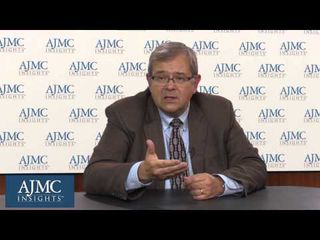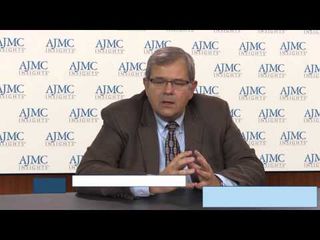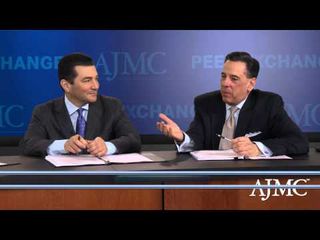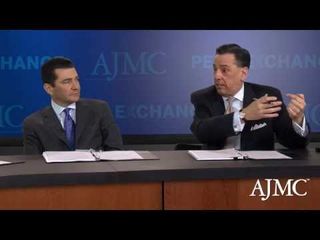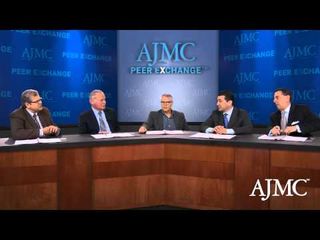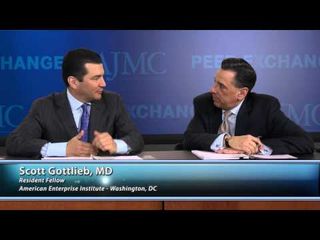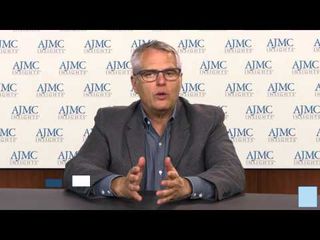
Health Care Cost
Latest News

Latest Videos

More News

There are many sources, and definitions, of where the value in cancer care lies. In this panel discussion, a cancer survivor and patient advocate, an oncologist, and a benefits professional provided their perspectives on what value in cancer care means to them.

Edward Licitra, MD, PhD, medical oncologist, Astera Health Partners, discusses his thoughts on what value-based cancer care entails and how physicians can best align their goals with those of the patient and health plan.

Kathy Oubre, MS, chief operating officer of Pontchartrain Cancer Center, discusses cost-saving implications of biosimilars in oncology, as well as several barriers that continue to impede their use.

Ted Okon, MBA, executive director of the Community Oncology Alliance, discusses what influence the new administration may have on payment reform in oncology and issues regarding the 340B drug pricing program.

With musculoskeletal care representing one of the leading cost drivers in health care spending for self-insured employers and health plans, a transition to preventive care characterized by both digital and in-person care solutions can lead to improved patient outcomes and cost savings.

Disease severity was strongly associated with health-related quality of life, moderately associated with use of disability insurance, and weakly associated with household income for patients with sickle cell disease.

Although the FDA has approved 599 orphan drugs since 1983, patent laws and other exclusivities keep most from any competition.

The bipartisan bill spells out 5 step therapy exemptions for patients by amending the Employee Retirement Income Security Act of 1974.

As the first quarter of 2021 ends, patients choosing to keep using secukinumab may be offered an inducement to switch to another biologic, ixekizumab.

Survey responses of 320 US hospitals highlight the dire consequences of the COVID-19 pandemic on facilities and point to a future of ongoing financial and staffing challenges.

More than two-thirds of patients with chronic lymphocytic leukemia (CLL) survived at least 2 years but were highly susceptible to adverse events (AEs), in a recent study.

Wound care is costly, costing at least $28.1 billion annually for the Medicare population alone. Treating patients with wounds can be complex as they often have multiple comorbidities that impede wound healing.

Generally, life sciences companies are aligned around the benefit of using value-based insurance design (VBID) to address health care costs and ensure that medications get to the patients who need them.

Pharmacists from the Cleveland Clinic discuss the impact of payer dispensing requirements, known as white bagging and brown bagging, on oncology practices and on patients.

The study examined the cost to Medicare when patients with end-stage renal disease switched from their employer-based health insurance to Medicare between 2007 and 2017 before the end of the 30-month coordination period.

A panel of experts provided consumer insights into value-based insurance design (VBID) and how the COVID-19 pandemic may have changed consumer behaviors in a way that VBID may be able to address as the country emerges from the pandemic.

A desire to remove barriers to high-value care and provide services that would improve health and quality of life drove early adopters of value-based insurance design (VBID).

After Medicare Part D plans stopped covering a chronic obstructive pulmonary disease (COPD) therapy, patients had gaps in care and increased out-of-pocket costs, according to a recent study.

During a session presented at the America’s Health Insurance Plans (AHIP) National Health Policy Conference, Michael Chernew, PhD, the director of Healthcare Markets and Regulation Lab at Harvard Medical School, and Mark McClellan, MD, PhD, founding director at Duke Margolis Center for Health Policy, discussed the potential for Medicare innovation and reforms in 2021 and beyond.

The $1.9 trillion spending package aimed at providing COVID-19 relief for those with low and middle incomes also represents the biggest investment in the exchange marketplaces created by the Affordable Care Act (ACA) since the landmark law was passed 11 years ago.

Investigators sought to better understand increasing price trends, including those seen among disease-modifying drugs to treat multiple sclerosis (MS) and other neurological diseases.

Direct inpatient and outpatient costs are significantly higher for patients with untreated spinal muscular atrophy (SMA) compared with matched controls.

Most orphan drug spending does not actually go to patients with rare diseases, a new study shows.

Hypertension, anemia, and infection were the most common adverse events associated with mantle cell lymphoma (MCL), while hepatotoxicity, stroke, and renal failure were the costliest per patient.

Donald M. Berwick, MD, MPP, the former CMS administrator who is president emeritus and senior fellow at the Institute for Healthcare Improvement, discusses cost variation in cancer care found through the digital classification system the COTA Nodal Address.




